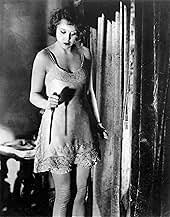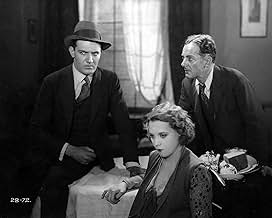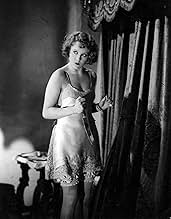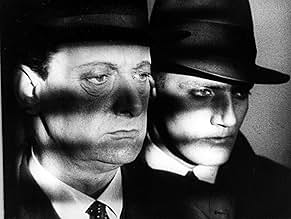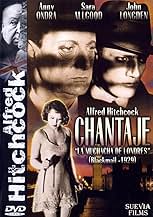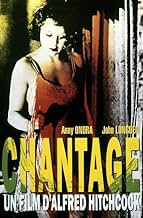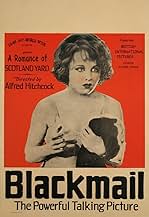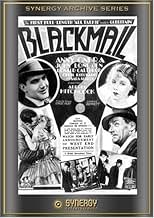After killing a man in self-defense, a young woman is blackmailed by a witness to the killing.After killing a man in self-defense, a young woman is blackmailed by a witness to the killing.After killing a man in self-defense, a young woman is blackmailed by a witness to the killing.
- Awards
- 2 wins total
Ex-Det. Sergt. Bishop
- The Detective Sergeant
- (as Ex-Det. Sergt. Bishop - Late C.I.D. Scotland Yard)
Johnny Ashby
- Boy
- (uncredited)
Joan Barry
- Alice White
- (voice)
- (uncredited)
Johnny Butt
- Sergeant
- (uncredited)
Alfred Hitchcock
- Man on Subway
- (uncredited)
Phyllis Konstam
- Gossiping Neighbour
- (uncredited)
Sam Livesey
- The Chief Inspector (silent version)
- (uncredited)
Phyllis Monkman
- Gossip Woman
- (uncredited)
Percy Parsons
- Crook
- (uncredited)
Featured reviews
Hitchcock's Blackmail might have been a total train wreck in the hands of a lesser talent. Instead, it is a remarkable piece of cinematic history, and still tremendously entertaining after 78 years. The film was partly shot when Hitchcock learned that he would have access to sound equipment. His female lead was a talented German silent picture actress, whose accent was too heavy for sound, so an off-camera reader had to be used, plus a decent amount of expensive film had already been used and had to be integrated into the 'talkie' as well.
All considered, the movie is probably the best example of the transition from these two cinematic paradigms that can be found.
The silent portion of the film establishes John Longden's character as a hard-nosed young Scotland Yard detective. Anny Ondra plays the lovely young lady who is engaged to him,and who soon becomes the center of our attention. One night after they argue over some petty matters, they part company and Anny meets up with a male artist friend, who, unbeknownst to her, is interested in more than just pleasant conversation. Frank (Longden) spots them leaving the restaurant and follows them for a while. The artist coaxes Alice (Ondra) up to his flat, and things take a sinister turn in short order.
Over the second half of the film, the plots unfolds, and the emotions and consciences of the protagonists are sorely tried.
What immediately blew my mind was what a great silent director Hitchcock was. Shouldn't have been too surprising since Hitchcock has always struck me as a master cinematographer. The first 20 minutes of the film are completely silent,and there are no interruptions from distracting story boards. Nevertheless, through incredible use of lighting, camera work, and evocative acting, you understand everything that is going on clearly, and are drawn straight into the edgy atmosphere so familiar to those who appreciate the work of this great director.
The acting is mostly very good. Only Longden sometimes seems to over or under-act his part, and Ondra is really wonderful all the way through. I was not surprised to learn of her lengthy and productive career both before and after this film and will now look for more of her work.It is also interesting to see how the actors adapted so readily to the new medium. Although some have said that the sound portion of this film seemed over-acted because the actors were still clinging to silent film conventions, I really can not agree. Some of the characters (Alice, for example) required very evocative, rather physical performances, and I can't imagine how she could have done better.
Highly recommended for the amazing photography, exceptionally professional though very early use of sound, and the typically perfect pace.
All considered, the movie is probably the best example of the transition from these two cinematic paradigms that can be found.
The silent portion of the film establishes John Longden's character as a hard-nosed young Scotland Yard detective. Anny Ondra plays the lovely young lady who is engaged to him,and who soon becomes the center of our attention. One night after they argue over some petty matters, they part company and Anny meets up with a male artist friend, who, unbeknownst to her, is interested in more than just pleasant conversation. Frank (Longden) spots them leaving the restaurant and follows them for a while. The artist coaxes Alice (Ondra) up to his flat, and things take a sinister turn in short order.
Over the second half of the film, the plots unfolds, and the emotions and consciences of the protagonists are sorely tried.
What immediately blew my mind was what a great silent director Hitchcock was. Shouldn't have been too surprising since Hitchcock has always struck me as a master cinematographer. The first 20 minutes of the film are completely silent,and there are no interruptions from distracting story boards. Nevertheless, through incredible use of lighting, camera work, and evocative acting, you understand everything that is going on clearly, and are drawn straight into the edgy atmosphere so familiar to those who appreciate the work of this great director.
The acting is mostly very good. Only Longden sometimes seems to over or under-act his part, and Ondra is really wonderful all the way through. I was not surprised to learn of her lengthy and productive career both before and after this film and will now look for more of her work.It is also interesting to see how the actors adapted so readily to the new medium. Although some have said that the sound portion of this film seemed over-acted because the actors were still clinging to silent film conventions, I really can not agree. Some of the characters (Alice, for example) required very evocative, rather physical performances, and I can't imagine how she could have done better.
Highly recommended for the amazing photography, exceptionally professional though very early use of sound, and the typically perfect pace.
A common motif in Alfred Hitchcock's movies is the guilty woman: "Blackmail", "Psycho" and "The Birds" are all prime examples. In "Blackmail", Alice White (Anny Ondra) goes home with an artist one night and he tries to rape her. She murders him, and from then on everything reminds her of it. The jester painting appears to be looking at her (or she at it?), a billboard looks like a knife, and a woman keeps uttering the word knife. But in the end, everything blows up in Alice's face.
Hitch was certainly showing his chops here. The camera angles, scenery, and other such things all combined to make what we would expect in a Hitchcock movie. I try to imagine being a moviegoer in 1929 watching "Blackmail" for the first time, wondering what Hitchcock's subsequent work would be like.
Hitch was certainly showing his chops here. The camera angles, scenery, and other such things all combined to make what we would expect in a Hitchcock movie. I try to imagine being a moviegoer in 1929 watching "Blackmail" for the first time, wondering what Hitchcock's subsequent work would be like.
A nice thriller with typical Hitch themes that remains famous thanks to a messy , complex story of attempted rape , killing in self-defense , blackmail , pursuit to death and look for Alfred's screen cameo . It is set in London , later a bitter discussion among lovers , the beautiful vendor Alice White (Amy Ondra , voice by Joan Barry) , sneaks away from her boyfriend and good-looking, efficient and impersonal Scotland Yard police , Frank Webber (John Longden) , to go out on an ill-advised date with the sleazy artist , Mr Crewe (Cyril Ritchard) . However, as the naive girl is lured into Crewe's studio, his sinister sexual advances will soon arm Alice's hand with a serrated bread knife, and before she knows it, the man lies dead in a pool of blood. As the saleswoman Alice getaways the scene of the crime in a numb haze , while the news of the unknown killer is spreading like wildfire all the way up to fiancé Frank's ears . Then Frank elides into a messy , personal story full of turns and while he attempts to keep his girlfriend from being involved .
An early talkie with script by Charles Bennett and Hitchcock himself , as usual , including a lot of sequences that remain genuinely amazing and striking . The dark atmosphere reeks with the feeling something nasty is going to happen any second . Britain's first period directed by Hitchcock who makes his ordinary small appearance on a tube train . It follows the police investigation of a murder with several twists and turns , while an invisible eyewitness will become a ruthless blackmailer . One of the first and best Alfred film to explore the ideas and themes that would become his trademarks , including climatic and memorable scenes . Future successful filmmakers Michael Powell and Ronald Neame were stills cameraman and clapper boy respectively .
The motion picture was well realized by Alfred Hitchcock , his first sound film for Great Britain . Being made as a silent movie , this was an early talkie , and still stunningly hypnotic to see today . In fact , being , nowadays ,more stimulating for its innovations in that area , and by experimenting with a peculiar narrative structure . This fine early effort by Hitch has several novelties , as the movie transcends the limitation of its mystery plot by dealing with thought-provoking issues and focusing on the theatrical meditations of reality . Here Alfred gives signs to be an expertise at tightening tension was already building up . The film belongs to Hitch's first British period when he directed silent films such as ¨The lodger¨ (1926) , ¨The ring¨(1927) , ¨Easy virtue¨ (1927) , ¨The Manxman¨(29) ; being ¨Blackmail¨(29) made as a silent , this was reworked to become a talkie . Following sound movies and early talkies as ¨Murder¨(1930 , ¨June and the Paycock¨(30) , ¨Skin Game¨(31) , ¨Rich and strange¨(32) , ¨Number 17¨(32) , ¨The man who knew too much¨(34) , ¨The 39 steps¨ (35) , ¨The secret agent¨(36) , ¨Sabotage¨(36) , ¨The lady vanishes¨(38) , ¨Jamaica Inn¨ (39) until he is hired by David O'Selznick to shoot¨Rebecca¨(40) in the US .
An early talkie with script by Charles Bennett and Hitchcock himself , as usual , including a lot of sequences that remain genuinely amazing and striking . The dark atmosphere reeks with the feeling something nasty is going to happen any second . Britain's first period directed by Hitchcock who makes his ordinary small appearance on a tube train . It follows the police investigation of a murder with several twists and turns , while an invisible eyewitness will become a ruthless blackmailer . One of the first and best Alfred film to explore the ideas and themes that would become his trademarks , including climatic and memorable scenes . Future successful filmmakers Michael Powell and Ronald Neame were stills cameraman and clapper boy respectively .
The motion picture was well realized by Alfred Hitchcock , his first sound film for Great Britain . Being made as a silent movie , this was an early talkie , and still stunningly hypnotic to see today . In fact , being , nowadays ,more stimulating for its innovations in that area , and by experimenting with a peculiar narrative structure . This fine early effort by Hitch has several novelties , as the movie transcends the limitation of its mystery plot by dealing with thought-provoking issues and focusing on the theatrical meditations of reality . Here Alfred gives signs to be an expertise at tightening tension was already building up . The film belongs to Hitch's first British period when he directed silent films such as ¨The lodger¨ (1926) , ¨The ring¨(1927) , ¨Easy virtue¨ (1927) , ¨The Manxman¨(29) ; being ¨Blackmail¨(29) made as a silent , this was reworked to become a talkie . Following sound movies and early talkies as ¨Murder¨(1930 , ¨June and the Paycock¨(30) , ¨Skin Game¨(31) , ¨Rich and strange¨(32) , ¨Number 17¨(32) , ¨The man who knew too much¨(34) , ¨The 39 steps¨ (35) , ¨The secret agent¨(36) , ¨Sabotage¨(36) , ¨The lady vanishes¨(38) , ¨Jamaica Inn¨ (39) until he is hired by David O'Selznick to shoot¨Rebecca¨(40) in the US .
I have seen most of Alfred Hitchcock's films, silent and talking, and was saving this one for a special occasion. It was really quite good and although over-rated despite being cited so often (along with Mamoulian's "Applause") as a successful example of the transition between the silents and talkies in all the references I've consulted, it still has some distinct good qualities of its own. Annie Ondra is an excellent silent actress and this among several other films proves it. Her accent was very strong, of course, and employing Joan Barry to "lip-synch" was genial. Francois Truffaut's interviews with Hitchcock about working with Ms Ondra were enough to stimulate anyone's appetite to see her (and to hear Joan Barry) at work. The music - at least in the beginning - is excessively burdensome and "busy" and frankly irritating. However, when the characters finally began dialogue, it calmed down considerably and actually worked out well until the ending. We're seeing a hybrid here: a talkie and a part-talkie. When the talking itself finally happens, the characters aren't even facing the camera but are photographed from behind! This is the famous Hitchcock we know and love in the heat of action. The view of the staircase is very Hitchockian as in "Vertigo" or "Psycho" as well as the chase in a public monument (North by Northwest" comes to mind). Yes, the director made the move to talking pictures quite fluently and fluidly. One should keep in mind, too, that the film had already been completed as a silent before being converted into a talkie! All the more to admire...
Curtis Stotlar
Curtis Stotlar
The film incorporates some of German Expressionism which was really obvious in the film. The beginning of the movie itself shows this through the use of lighting and shadows. A recurring theme is the framing of the face with a dark surround, and light shining only on the eyes. This creates a very intense and eerie sort of mood, which consolidate the theme of Expressionism.
The acting is pretty good and both Anny Ondra and John Longden did well. Ondra greatly showed the expressions of a person recently exposed to trauma, and the close-ups of her occupied and fearful expressions emphasize her guilt. Longden first starts off as a pre- occupied character who doesn't pay much attention to Alice, but after the murder he becomes more concerned and does his best to keep her from confessing. I find it interesting that the film goes about different ways to silence Alice. She is never given a chance to tell her story, and hardly gets any input.
The story was average for me, but I guess for that time period it could have been engaging. I felt that it lacked motivation on the part of the blackmailer (Donald Calthrop) and that his character just popped up so suddenly.
The cinematography however was pretty creative. As mentioned before, there was some Expressionistic styles used in the film, and camera placements helped with that. Also, the beginning scene had a really great shot from a mirror that showed a criminal's point of view.
I watched the version of this film with sound recorded, and it was pretty ingenious how sound was synchronized. The voice of Alice is from another actress, and Ondra was miming the words in the film. Though the sound at the beginning of the film is inconsistent and very much like a silent film, it got better throughout the film. Noticeably there was use of ambient noise as well as back shots of characters to eliminate sound synchronization problems. The use of sound to enhance Alice's subjective perception was also a great addition. A obvious example of this is when the neighbour starts gossiping and all Alice hears is "knife blah blah blah knife! blah blah knife!" That was pretty comedic (and annoying after awhile) but could be related to how Alice was hearing things.
Read more movie reviews at: champioangels.wordpress.com
The acting is pretty good and both Anny Ondra and John Longden did well. Ondra greatly showed the expressions of a person recently exposed to trauma, and the close-ups of her occupied and fearful expressions emphasize her guilt. Longden first starts off as a pre- occupied character who doesn't pay much attention to Alice, but after the murder he becomes more concerned and does his best to keep her from confessing. I find it interesting that the film goes about different ways to silence Alice. She is never given a chance to tell her story, and hardly gets any input.
The story was average for me, but I guess for that time period it could have been engaging. I felt that it lacked motivation on the part of the blackmailer (Donald Calthrop) and that his character just popped up so suddenly.
The cinematography however was pretty creative. As mentioned before, there was some Expressionistic styles used in the film, and camera placements helped with that. Also, the beginning scene had a really great shot from a mirror that showed a criminal's point of view.
I watched the version of this film with sound recorded, and it was pretty ingenious how sound was synchronized. The voice of Alice is from another actress, and Ondra was miming the words in the film. Though the sound at the beginning of the film is inconsistent and very much like a silent film, it got better throughout the film. Noticeably there was use of ambient noise as well as back shots of characters to eliminate sound synchronization problems. The use of sound to enhance Alice's subjective perception was also a great addition. A obvious example of this is when the neighbour starts gossiping and all Alice hears is "knife blah blah blah knife! blah blah knife!" That was pretty comedic (and annoying after awhile) but could be related to how Alice was hearing things.
Read more movie reviews at: champioangels.wordpress.com
Did you know
- TriviaMuch of the filming originally was shot silently. When sound became available during the course of shooting, Sir Alfred Hitchcock reshot certain scenes with sound, thus making it his first talkie. There was one complication with this change, however. Leading lady Anny Ondra had a thick Czech accent which was inappropriate for her character, Alice White. Joan Barry was chosen to provide a different voice for her, but post-production dubbing technology did not exist then. The solution was for Barry to stand just out of shot and read Alice's lines into a microphone as Ondra mouthed them in front of the camera. [This is a major plot point of Singin' in the Rain (1952), which is set in the era of movie studios moving from silent pictures to talkies.] This generally is acknowledged as the first instance of one actress' voice being dubbed by another, even though the word "dub" is technologically inappropriate in this case.
- GoofsAt about 0:24:30 when Crewe (Cyril Ritchard) is talking to Alice (Anny Ondra), he calls her "Anny" before correcting himself.
- Quotes
Alice White: You and your Scotland Yard! If it weren't for Edgar Wallace, no one would ever have heard of it.
- Alternate versionsOriginally filmed as a silent movie, running 75 minutes; Hitchcock later added newly shot scenes and had other existing footage dubbed to create a talkie version, running 86 minutes.
- ConnectionsEdited into Der Zinker (1931)
- SoundtracksMiss Up-to-Date
(1929) (uncredited)
Words by Frank Eyton and music by Billy Mayerl
Performed by Cyril Ritchard
Details
Box office
- Gross worldwide
- $160
- Runtime
- 1h 25m(85 min)
- Color
- Aspect ratio
- 1.20 : 1
Contribute to this page
Suggest an edit or add missing content

